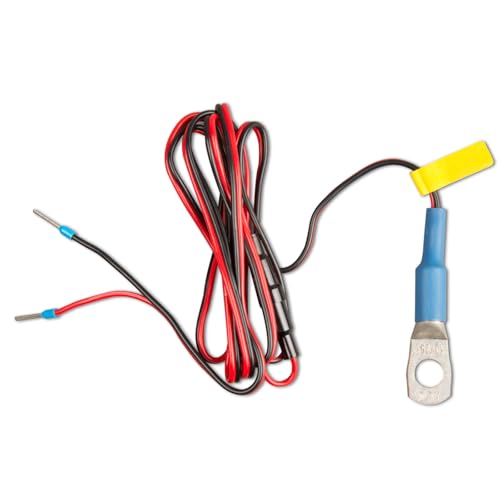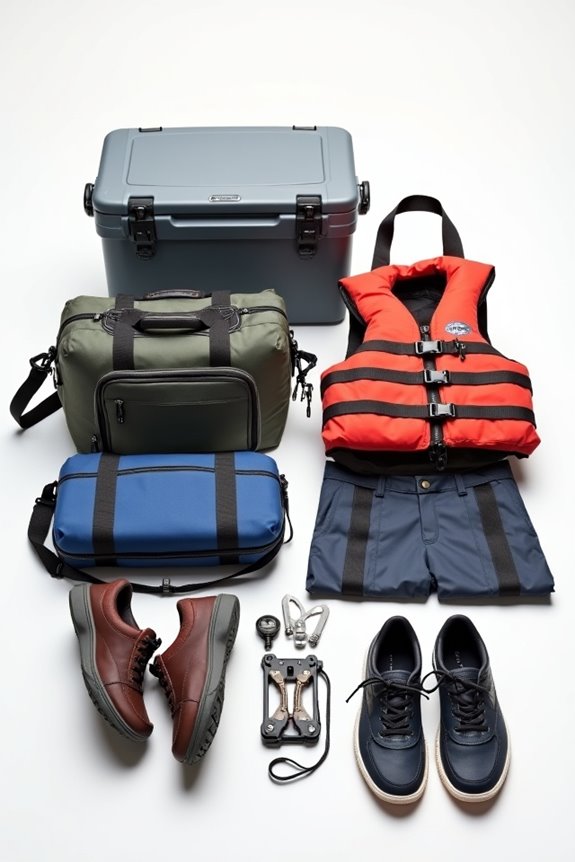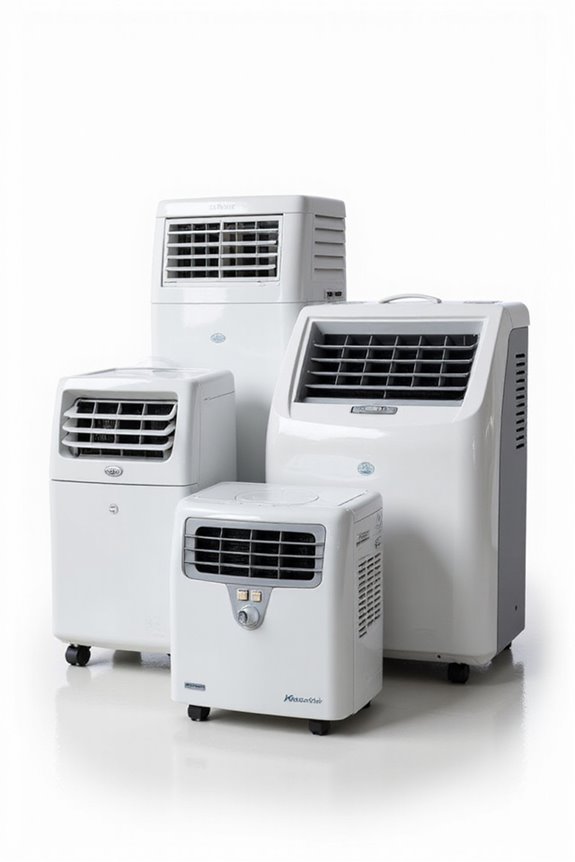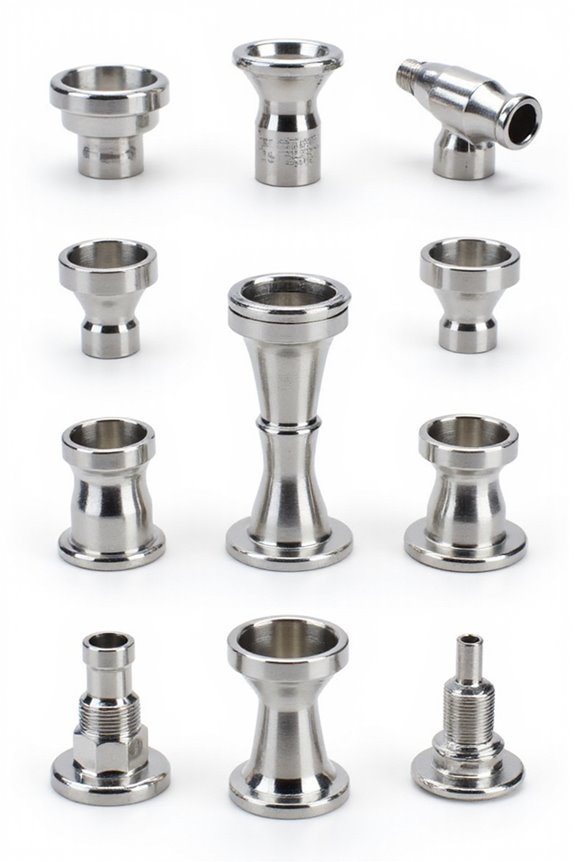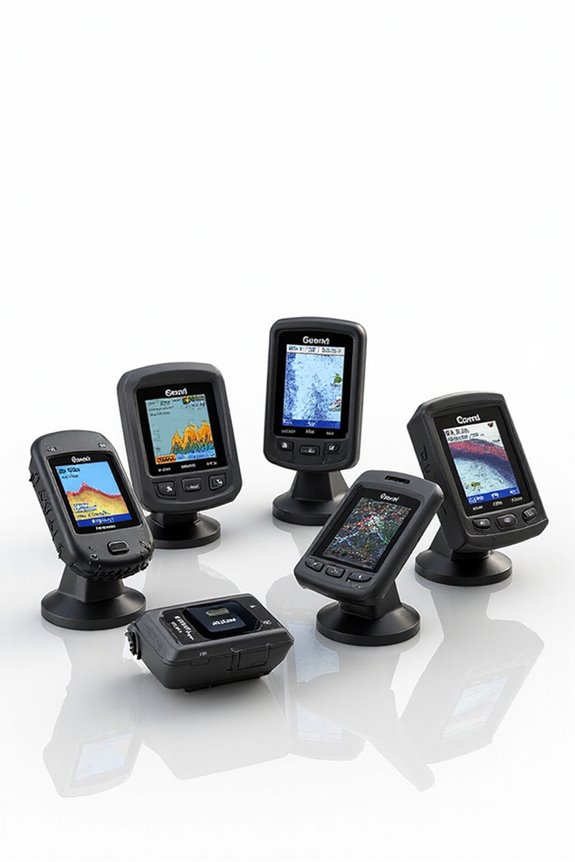As an Amazon Associate, we earn from qualifying purchases. Some links may be affiliate links at no extra cost to you. Although our opinions are based on curated research, we haven't used these products. Articles generated with AI.
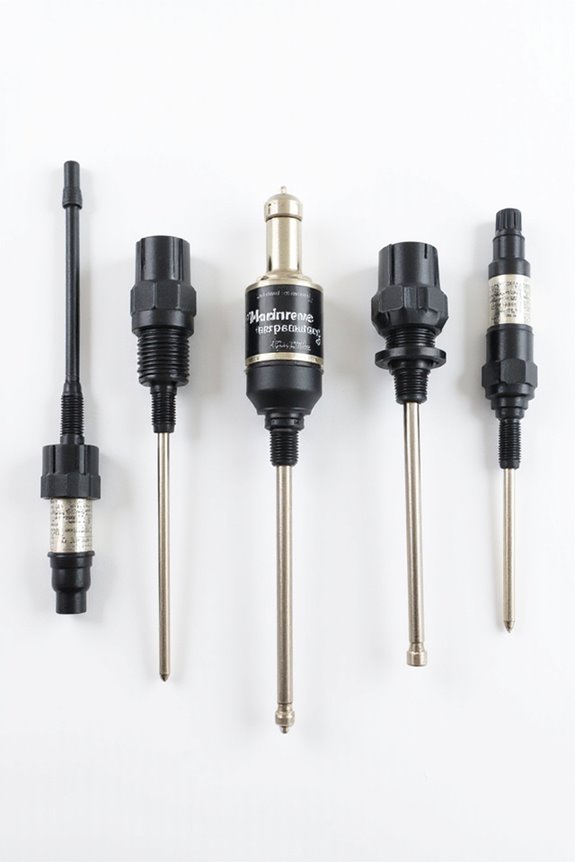
5 Best Marine Battery Temperature Sensors to Keep Your Boating Safe and Efficient
Looking to keep your boat safe and efficient? Choosing the right marine battery temperature sensor can be a game-changer! For starters, check out the Full-View Digital LCD Engine Thermometer—it’s user-friendly. Then there’s the Victron Energy Sensor, designed for specific models. Don’t overlook the Xantrex 809-0946; it’s reliable and efficient. AIMS Power’s sensor is also worth your time. Finally, the Universal Water Temperature Gauge Kit is versatile for many setups. Stick around, and you’ll discover key factors to evaluate!
Key Takeaways
- Choose sensors compatible with battery management systems and designed for easy, secure mounting on battery terminals.
- Look for accuracy ratings of ±1% and a wide temperature range from -20℃ to +100℃.
- Select rugged, durable sensors with an IP67 waterproof rating to withstand harsh marine conditions.
- Opt for devices with response times under one second for quick detection of temperature changes.
- Ensure available support and warranty options cover materials and workmanship for peace of mind.
Full-View Digital LCD Engine Thermometer for Motorcycle and ATV
NInE-ROnG Full-View Digital LCD Engine Thermometer Temperature Gauge Over-Temperature Alert Battery...
- ENGINE TEMPERATURE METER--- Multifunctional thermometer to record the temperature of the engine in real time, you can set maximum temperature, over-temperature alert and...
- MAXIMUM TEMPERTURE--- Display the engine temperature when the sensor is connected correctly which is resttable. Maximum measurement range: -20℃ to +220℃(-4℉ to...
- TEMP REMINDER--- You can set a temp alert to remind you when the engine temperature is over this value. When the current temperature is higher than the value, the display...
Are you an outdoor enthusiast who loves the adrenaline rush of riding motorcycles, ATVs, or even exploring the open seas on your boat? If so, you’ll appreciate the Full-View Digital LCD Engine Thermometer. It tracks engine temperatures in real-time across a range of -20℃ to +220℃. Set alerts to notify you when things get too hot—literally! With an easy-to-install design, you’ll be ready to roll in no time. Plus, it’s waterproof, so don’t sweat that splash! Just remember, some users mentioned frequent battery changes, which can feel like a mini workout. Overall, it’s a handy gadget for your adventures!
Best For: Outdoor enthusiasts and thrill-seekers who need reliable engine temperature monitoring for motorcycles, ATVs, and marine vehicles.
Pros:
- Real-time temperature tracking with customizable alerts for overheating.
- Easy installation and waterproof design make it suitable for diverse outdoor conditions.
- Comes with a 2-year warranty, providing assurance against defects.
Cons:
- Reports of frequent battery changes every 5 days raise concerns about efficiency.
- Mixed user feedback regarding reliability and accuracy may lead to dissatisfaction.
- Some users experienced malfunction after short usage periods, impacting product durability.
Victron Energy Temperature Sensor for Victron Energy BMV-702/712
Sale
Victron Energy Temperature Sensor for Victron Energy BMV-702/712
- Victron Energy Temperature sensor for Victron Energy BMV-702 or BMV-712 battery monitor
- This product will only work with a Victron Energy BMV-702 or BMV-712 battery monitor
- When using the temperature sensor, the second battery voltage and midpoint voltage monitoring are not available
If you’re on the lookout for a reliable way to monitor your battery temperature, the Victron Energy Temperature Sensor for BMV-702/712 might just be your new best friend. This nifty device enhances your battery charging accuracy by using real-time temperature data. Installation is straightforward—just splice some wires and mount the sensor on the positive battery terminal. Those who’ve used it love how quickly it sets up and how accurately it reads temperatures. Just a heads up: temperature readings can vary depending on where you place it, especially in cooler conditions. With Bluetooth capabilities, you can keep tabs on things—what’s not to love?
Best For: Individuals using Victron Energy BMV-702/712 battery monitors who want precise battery temperature readings for enhanced charging accuracy.
Pros:
- Easy installation with clear instructions, making setup quick and straightforward.
- Provides accurate temperature readings, helping optimize battery performance and charging.
- Bluetooth connectivity allows for convenient monitoring of battery status.
Cons:
- Requires wire splicing for installation, which may deter less experienced users.
- Temperature readings can be affected by the sensor’s placement, especially in cooler environments.
- Some reports of product quality variability, including occasional instances of faulty units.
Xantrex 809-0946 Battery Temp Sensor for Freedom SW, 25
Xantrex 809-0946 Battery Temp Sensor for Freedom SW, 25'
- Battery Temperature Sensor: Measures temperature of battery in a bank or on the side of a battery
- Cable Length: 25' cable (phone cable) for convenient placement
- Compatibility: For Freedom SW, RVs, and inverter/chargers
Looking for a reliable way to keep tabs on your battery temperature? Check out the Xantrex 809-0946 Battery Temperature Sensor! This nifty little device lets you monitor conditions for your Freedom SW inverter/charger and other RV setups. With a 25-foot cable, it offers flexible placement options, so you can install it wherever you need. Plus, it’s accurate to within ±1%—pretty impressive, right? The flange mount guarantees a secure attachment, giving you peace of mind while you’re out on the water. Users rave about its simplicity and effectiveness, making it a must-have for maneuvering fluctuating temperatures. Stay safe and efficient!
Best For: The Xantrex 809-0946 Battery Temperature Sensor is best for RV enthusiasts and boaters who need to monitor battery temperatures for optimal performance in varying conditions.
Pros:
- Accurate Measurement: Provides temperature readings with a precision of ±1%.
- Flexible Installation: Features a 25-foot cable, allowing for convenient placement in various setups.
- Easy to Use: Simple installation process that users find straightforward and efficient.
Cons:
- Limited Compatibility: Specifically designed for Freedom SW models and may not work with other systems.
- Plastic Construction: While lightweight, the plastic material may be less durable than metal alternatives.
- Warranty Period: Limited 1-year warranty may not provide enough coverage for long-term users.
AIMS Power Battery Replacement Temperature Sensor
Sale
AIMS Power PICGLFBATS Battery Replacement Temperature Sensor 12 Month Warranty
- 12-Month Warranty by Wholesale Sensors, a USA Manufacturer: Rest easy knowing your purchase is protected by our 12-month warranty. Wholesale Sensors, a trusted USA...
- Replacement for AIMS Power PICGLFBATS Battery Temperature Sensor
- Specifically designed for AIMS Power PICGLFBATS, our replacement sensors seamlessly integrate with your existing battery system. Experience hassle-free installation and...
For anyone managing a marine battery system and in need of reliable temperature monitoring, the AIMS Power Battery Replacement Temperature Sensor is a standout choice. This sensor, measuring 32 feet in overall length, integrates seamlessly with your existing battery systems. Built for durability, it thrives in various environmental conditions, so you won’t have to worry about it failing in the middle of your adventure. Plus, its plug-and-play design makes installation a breeze—no complicated wiring needed! And with a 12-month warranty from Wholesale Sensors, you’re getting a quality product backed by a trusted USA manufacturer. What’s not to love?
Best For: Individuals managing marine battery systems who need reliable and easy-to-install temperature monitoring solutions.
Pros:
- Durable and reliable design suitable for various environmental conditions.
- Easy installation with a user-friendly, plug-and-play design.
- Backed by a 12-month warranty from a trusted USA manufacturer.
Cons:
- Limited to integration with existing battery systems only.
- Length of 32 feet may not be necessary for all installations, potentially leading to excess cable.
- Warranty period of 12 months may not suffice for long-term use in extreme conditions.
Universal Water Temperature Gauge Kit (100-250℉) for Automotive and Marine
BREADEEP Universal 2"/52mm Water Temperature Gauge 100-250℉ Water Temp Gauge Kit DC12V with LED...
- 【High Quality】The water temperature gauge is made of ABS plastic and stainless steel, with a wear-resistant, scratch resistant, corrosion resistant, and oxidation...
- 【Parameter】Power: 12V DC, Measurement Range: 100-250 Fahrenheit. Sensor mounting thread: 1/8" NPT. High sensitivity and easy operation. Diameter 2 "52mm automotive...
- 【Easily Display at Night】Our Water Temp Gauge is highly visible with a Light,easy viewing at all angles during any lighting conditions,practically and safely when...
When you’re out on the water or cruising down the highway, knowing your engine’s temperature can mean the difference between a smooth ride and a trip to the repair shop. Enter the Universal Water Temperature Gauge Kit. With a measurement range of 100-250°F, it’s perfect for cars, trucks, and even motorcycles. Its high sensitivity and easy operation guarantee you won’t be left guessing. Plus, that bright LED light indicator? You’re definitely gonna love it when night falls. Just keep in mind that while it’s budget-friendly, some users found accuracy issues. Still, for the price, it’s worth considering!
Best For: Those seeking an affordable water temperature gauge option for their vehicles, particularly if they enjoy night driving.
Pros:
- High sensitivity allows for accurate temperature readings within a wide range of 100-250°F.
- Bright LED light indicator ensures visibility during nighttime conditions, enhancing safety.
- Universal compatibility makes it suitable for various vehicles, including cars, trucks, and motorcycles.
Cons:
- Mixed reviews on accuracy, with some users reporting readings that are 25°F high.
- Installation challenges may arise, especially for older users or those unfamiliar with technical setups.
- Complaints about missing components or malfunctions have been noted, affecting overall user satisfaction.
Factors to Consider When Choosing a Marine Battery Temperature Sensor
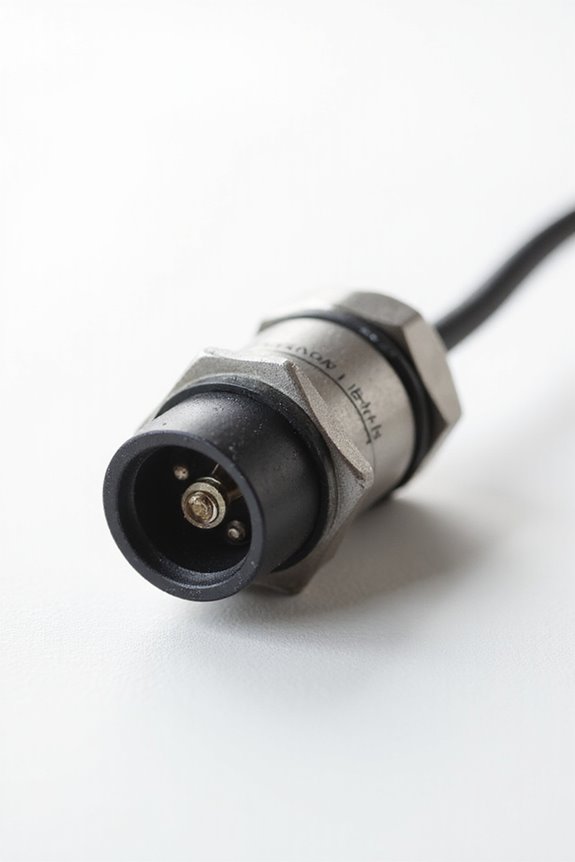
When you’re picking a marine battery temperature sensor, there are a few essential factors to keep in mind. You’ll want to make sure it’s compatible with your current systems and that it offers accurate measurements within a suitable range. Plus, think about how easy it is to install, alongside its durability—nobody wants a sensor that quits on a turbulent sea, right?
Compatibility With Existing Systems
Choosing a marine battery temperature sensor can feel a bit intimidating, especially if you want it to play nice with your existing systems. First, make sure the sensor is compatible with your battery monitor; some need specific models and might require splicing wires. You wouldn’t want to create a wiring nightmare aboard your boat, right? Check if the sensor mounts easily to your battery terminal and matches your battery management system’s connection type. Also, think about its operating temperature range—it’s essential for monitoring fluctuations in harsh marine environments. Finally, consider durability; a good sensor should withstand moisture and saltwater without giving up. After all, you want it to keep your boat safe and efficient!
Measurement Accuracy and Range
How important is measurement accuracy and range when picking a marine battery temperature sensor? Quite a bit! You want a sensor that boasts an accuracy rating of ±1%—it guarantees reliable performance, preventing possible damage to your battery systems. Plus, it’s essential to pick one with a measurement range that covers extreme conditions, typically from -20℃ to +100℃. Why? Because marine environments can be unpredictable! A wide range allows better monitoring of your battery’s performance, optimizing its life and efficiency. Look for sensors that maintain accuracy throughout their range and maybe even include features like temperature alerts. After all, nobody enjoys unexpected surprises when they’re out on the water, right? Keep it safe, keep it efficient!
Installation Process and Ease
Even with the right marine battery temperature sensor, the installation process can feel like maneuvering through a maze, but it doesn’t have to be that way! Look for a user-friendly, plug-and-play design to dodge those confusing wires. Trust me; you don’t want to spend an afternoon wrestling with complicated instructions! Make certain your sensor comes with detailed, clear installation guides that show you exactly what to do. Check that it can be securely mounted—flange mounts or terminal attachments are solid choices. And don’t forget to assess cable length; you want it to reach without any strain. Finally, make sure it’s compatible with your existing battery systems to avoid any future headaches. Simple, right? Happy boating!
Durability and Reliability Features
When it comes to marine battery temperature sensors, durability and reliability are king! You’ll want sensors with rugged designs that can handle harsh marine environments. After all, Mother Nature can be a real tough cookie! Look for a good waterproof rating, like IP67, to keep water exposure at bay—this is essential on the water. Also, aim for a wide temperature measurement range, ideally from -20℃ to +220℃, so it handles those wild temperature swings. Make sure the sensor has a sturdy mounting mechanism, like flange mounts, to avoid it getting jostled around by vibrations. And hey, if it comes with a warranty, that’s a cherry on top—indicating confidence in quality and reliability over time!
Warranty and Support Options
After focusing on durability and reliability features, it’s time to chat about something just as important: warranty and support options. When you’re picking a marine battery temperature sensor, you’ll want to check the warranty period, which can range from 1 to 12 months. A longer warranty often means the manufacturer believes in their product. Make sure it covers defects in materials and workmanship, giving you peace of mind. It’s also smart to look for thorough support options. Are there clear installation instructions? Is customer service available when you need it? And don’t forget to research user feedback on how well the company handles warranty claims. Positive experiences here could save you a lot of headaches down the line!
Sensor Response Time
As you plunge into the world of marine battery temperature sensors, don’t overlook one critical aspect: sensor response time. It’s essential for accurately monitoring battery temperatures, as a faster response means quicker detection of temperature changes. You ideally want a sensor that reacts in less than one second—think of it as your battery’s best friend, always ready to adapt. Why’s that important? Well, fast response times help prevent overheating, sparing your battery from damage. A slow sensor? That could lead to inaccurate readings, jeopardizing your battery’s lifespan and performance. When browsing, make sure to check the product specifications for this detail. After all, you wouldn’t want your boat to feel a little sluggish because you chose the wrong sensor!
Frequently Asked Questions
How Do I Install a Marine Battery Temperature Sensor?
Installing a marine battery temperature sensor is super straightforward! First, find a spot on your battery where you can attach the sensor using the adhesive backing. Clean the surface, so it sticks well. Next, mount the display unit near your control panel for easy access. Connect the wires according to the manual, ensuring they’re secure but not too tight—no one likes a stressed wire! Finally, test it out to make sure everything’s working. Easy peasy!
What Is the Ideal Operating Temperature for Marine Batteries?
The ideal operating temperature for marine batteries is typically between 50°F and 85°F. If it gets too hot, battery performance can drop, and you might end up stranded—definitely not ideal! Conversely, temperatures below 32°F can cause batteries to freeze, reducing their lifespan. So, keep an eye on the temperature. Treat your battery like a pet; it thrives in a comfy spot, not on a hot sunbaked deck!
Can Temperature Sensors Be Used for Other Applications?
Think of temperature sensors as your trusty sidekick in many situations, not just marine batteries. You can use them in HVAC systems, cars, and even in your kitchen to guarantee food safety. Isn’t it comforting to know these little gadgets help you avoid overheating appliances or spoiled leftovers? They monitor temperatures, alerting you when things get too hot to handle. So, whether you’re grilling or cruising, temperature sensors are always on the job!
How Often Should I Check My Battery Temperature Readings?
You should check your battery temperature readings regularly—about once a week is a good start. If you’re heading out for a long trip, peek at those readings daily. Why? Because hot batteries can be unhappy batteries, leading to untimely failures. Plus, excessive heat can mess with performance. So, stay vigilant! It’s like giving your battery a little check-up. Remember, a little attention now can save you from bigger headaches later!
What Are the Signs of Battery Overheating?
They say, “A stitch in time saves nine,” and that couldn’t be truer for battery care! If your battery’s overheating, you’ll notice signs like swelling, a strange odor, or even leaking fluid. Don’t be alarmed if it starts making unusual noises, either; it’s clearly unhappy! Keep an eye on the temperature readings—if they’re soaring, it’s time to cool things down and check your connections. Remember, a little attention now means fewer headaches later!


